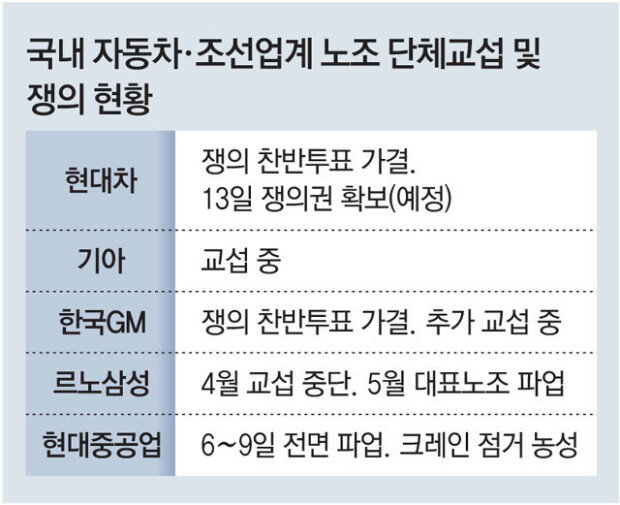KOREA
Hyundai Motor Company labor union votes on possible strike
Posted July. 09, 2021

The labor union members of Hyundai Motor Company voted 80 percent in favor of a possible strike. Unless a collective agreement is reached on wages and working conditions between the union and management, they may stage a strike for the first time in three years since 2018.
According to Hyundai Motor Company on Thursday, 43,117 members of the Hyundai Motor Company branch of the Korean Metal Workers' Union under the Korean Confederation of Trade Unions voted 83.2 percent in favor of a strike. The union and management have had 13 negotiations since May but have not found a middle ground.
The vote result does not mean an immediate strike. A legal strike is possible only after the strike committee of the labor union discusses whether to proceed with a strike and the National Labor Relations Commission decides to discontinue arbitration based on the judgment that there is a huge gap between the labor union and management’s stances. Hyundai Motor Company’s labor union reached a settlement in 2019 and 2020 without labor disputes.
The key issue of the negotiation this year is the extension of the retirement age. The labor union requested raising the retirement age to 64 when national pension benefits begin to be provided. Management said they cannot accept the proposal when even new hiring is challenging.
A solution for the issue is complicated as employees share different opinions on the issue of retirement age extension. According to the labor union’s survey, 51 percent voted in favor of and 49 percent voted against the issue. In particular, those who were born in the 1970s or later are opposing the proposal. The union of office workers and researchers, mostly composed of the millennials and Gen-Z, is demanding fair compensation based on performance, rather than retirement age extension.
Some say that such conflicts between labor and management affect the competitiveness of the South Korean industries. According to the Korea Economic Research Institute’s comparison of South Korea against four countries with over 50 million population and 70 percent employment rate, 1,000 South Korean workers missed 38.7 workdays per year on average between 2009 and 2019 due to strikes, which is 193.5 times higher than Japan (0.2 days), 5.8 times higher than Germany (6.7 days), 5.4 times higher than the U.S. (7.2 days), and 2.2 times higher than the U.K (18 days). It was also reported that Hyundai Motor Company had lost 180 billion won to 3.1 trillion won due to strikes held between 2012 and 2019.
“Negotiations between labor and management of Hyundai Motor Company are the barometers of the labor-management relations in South Korea and will have a big impact on the industry and labor sector,” professor Park Ji-soon, the dean of the Graduate School of Labor Studies, said. “The situation poses a crossroads between return to the traditional confrontational relations and a future industrial transition with an effective strategy.”
Dong-Jin Shin shine@donga.com

No comments:
Post a Comment